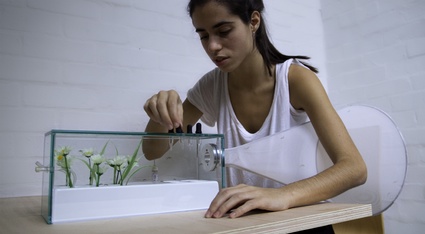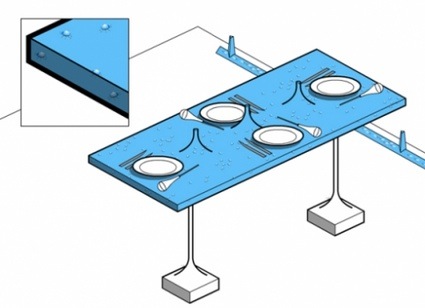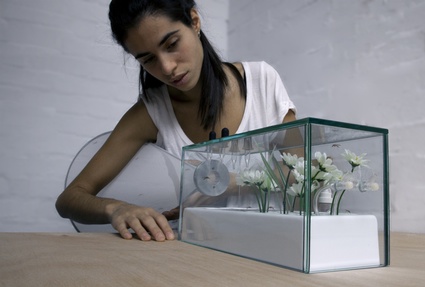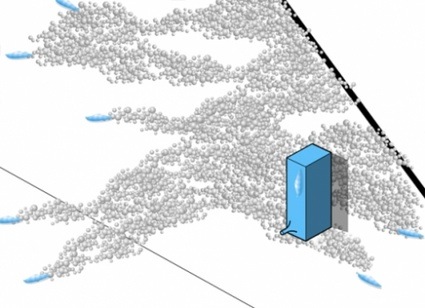
A year ago, Dr Lisa Page and Dr Louise Howard from the Institute of Psychiatry at King’s College London published a report in which they expressed their concerns about the potential (and much undiscussed) mental health consequences of climate change. The negative impacts on mental health range from anxiety resulting from emerging infectious disease outbreaks to post-traumatic stress disorder following natural disasters.
Dr Page and Dr Howard’s paper inspired Symbiotic Households, one of the projects selected for Demain, c’est aujourd’hui #3 (Tomorrow is Today), an exhibition on prospective design which was part of International Design Biennial in Saint Étienne, France.
Elliott P. Montgomery‘s project attempts to identify and visualize the new needs -mental or not- that arise as a result of climate changes. Symbiotic Households is set in a not so distant future where the new needs of the inhabitants are met through symbiotic relationships with modified organisms: flavor-augmented insects that substitute prohibitively expensive imported food, color-changing butterflies that warn the family of hazardous outdoor conditions (heat, ozone and UV), blackout preparedness through symbiosis with bio luminescent ants, etc. And then there is the prototype exhibited earlier this month in Saint-Etienne: the Vector Hatchery, a future domestic product that could offer a low cost way to regulate mood.
The hatchery is designed to house mosquito colonies modified to biologically manufacture mood stabilizers. Mosquitoes deliver modified saliva through a permeable mesh. The keeper is left with spots which might serve as sensory reminders that the unconventional therapy has been administered.
I asked designer Elliott P. Montgomery to give us more details about the hatchery:
Did you consider the unpopularity of mosquitoes when you designed the hatchery? Wouldn’t they repel people? After all, mosquitoes are also associated with infectious diseases that affect millions of people each year.
The mosquito is essentially a provocative device. The Symbiotic Households series was meant to investigate the impacts of a transforming climate. These days, people are bombarded with the ubiquitous dialogue focused on melting polar ice and sea-level rise… but in actuality, climatologists expect that rising waters will only affect a small percentage of the global population. I wanted to explore potential implications that might affect the desensitized masses (especially in post-industrial nations) right inside our homes.
The first proposal, the Vector Hatchery, came about after discovering a fascinating study on the possible mental health implications of changing climates. Two King’s College researchers published a paper in which they hypothesized that rising natural disaster frequency could yield increases in mental depression rates. I spoke with Dr. Page about the details of the report, and was inspired to create a response that was equally as unsettling as their hypothesis. Imagine the shiver down your spine at the sound of a mosquito’s wings – that’s the feeling I was after.
Why the modified mosquito? What better way to deal with a future need than with a future technology? Genetic manipulation is currently in its infancy, but already offers the ability to combine traits of various organisms. According to synthetic biologists, it really might be possible to create these types of insects in the not-so-distant future.
 Flavor-augmented insects provide food supplementation as food shipment becomes prohibitively expensive
Flavor-augmented insects provide food supplementation as food shipment becomes prohibitively expensive
Vector hatchery is part of a series of proposals that intend to help people face the daily life consequences of climate change. One of them, the flavor-augmented insects, stands out from the other proposals because it is totally believable. In fact, the text explaining your project at the Saint-Etienne exhibition defined Vector Hatchery as ‘a future domestic product intended to offer a low cost but dubious method of coping with widespread mental health problems.” Why did you design a ‘dubious’ answer to the problem?
An earnest ‘answer’ to such difficult problems would be naive. By offering a problematic answer, I want to encourage viewers to question the entire scenario and thereby take part in the discussion.
Yes, the flavor-augmented insects are very believable, but the others are really not too far out either. Scientists have already made green fluorescent rabbits and banana scented e-coli. These other proposals are closer than some people imagine.
 Why would people chose to breed mosquitoes over popping a couple of happy pills in the morning? Is it even safe to be bitten by a genetically modified mosquito?
Why would people chose to breed mosquitoes over popping a couple of happy pills in the morning? Is it even safe to be bitten by a genetically modified mosquito?
Within the fictitious scenario, a colony of self-replicating drug manufacturers makes an elegant choice. Breeding mosquitoes requires minimal energy and expenditures. Also, mosquitoes have the natural ability to inject saliva into the human bloodstream, a more efficient way to take medication. Throw in a few flowers for daily feeding (mosquitoes consume nectar for most of their lives) and pools of water for laying larvae and the mosquito colony is ready to go. Containing the colony within the hatchery would hypothetically prevent it from transmitting diseases. But is it really safe? I doubt the FDA would approve it.
 Modified slugs provide variable home insulation for drastically fluctuating seasonal weather
Modified slugs provide variable home insulation for drastically fluctuating seasonal weather
The video accompanying your project depicts a spine-chilling future made of power cuts, mental depression, hazardous outdoor conditions, etc. Do you really think it’s going to be that bad?
Absolutely not. This project over-dramatizes future problems as an experiment in provocation. The jury is still out on whether this is an effective strategy. Since developing this project, I’ve spoken with many energy experts about the difficulties we face as a global community. These experts resoundingly believe that with strong financial support and the brightest minds focusing on progressive energy research, the future will be different but bright. I agree with them
Thanks Elliott!
